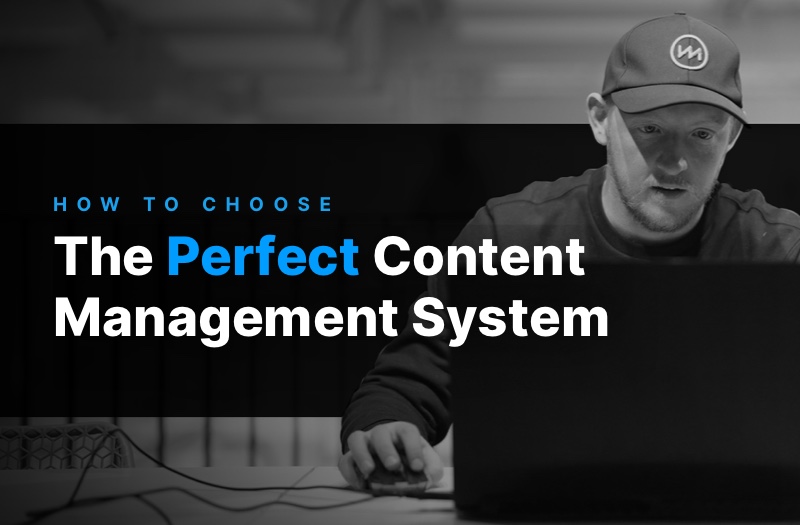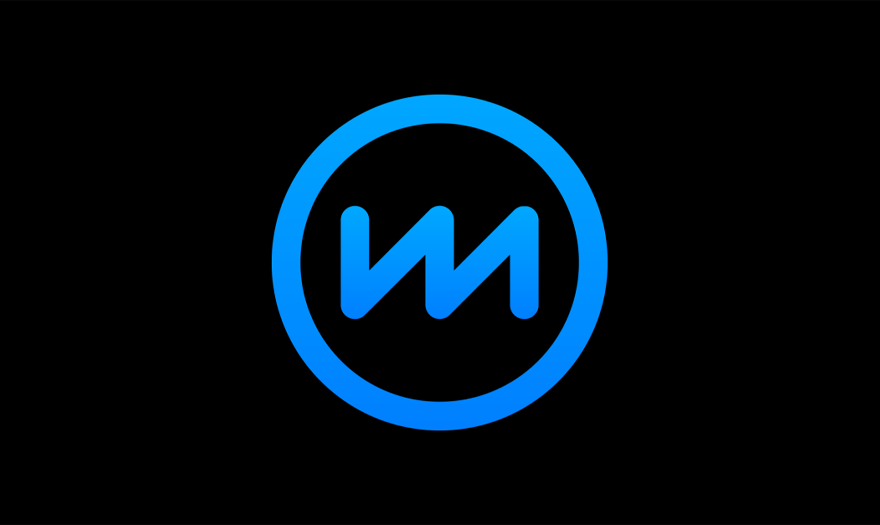
Choosing the perfect content management system (CMS) is one of the most important decisions you’ll have to make for your business and ultimately, your website.
Are you wondering which CMS you should use for your website?
Everyone’s talking about WordPress these days. WordPress templates, WordPress plugins, WordPress themes.
But what if I told you there was something better, something quicker?
In this blog, we’re diving into the different types of content management systems and the 8 factors to consider when choosing the perfect CMS.
Table of Contents – Choosing a CMS
- What is a CMS?
- Why do you need a CMS?
- Types of CMS Platforms
- Choosing a CMS
- Ease of Use
- Functionality
- Search Engine Optimization
- Budget & Licensing
- Platform Security
- Integrations
- Scalability
- Performance
What is a CMS?
A content management system (CMS) is a platform which allows you to easily create and modify a website and its content.
Here’s an example: WordPress. I can guarantee that you’ve heard about it before, it is the world’s most popular website builder, with about 65% of the CMS market share.
Being that WordPress is the most popular, it should be evident that they’re doing something correctly, right?
Absolutely, WordPress makes it easy for anyone to create a website with themes, templates, plugins and plenty of tutorials. But it isn’t as perfect as people make it out to be, WordPress has its limits too.
We’re here to give you a general overview of content management systems to help you choose what’s best for your business. Let’s start by answering a common question – why do you need one?

Why Do You Need a CMS?
Creating your website from the ground up isn’t a feasible option for most. It requires plenty of programming, web design, hosting, web security, etc…
So unless you have months of free time to learn and develop your website, you will need a CMS.
Then, you need to make sure you find the perfect fit for your business. Without the right system in place, it almost doesn’t matter how good your content is.
If you can’t edit, upload and manage content properly, your website won’t get the results it deserves. Now, let’s look at the types of CMS platforms to find what works best for you.
Types of Content Management Systems
Before you can choose your ideal CMS, you will need to write down a short list of requirements and expectations that you have for your website.
Are you looking for a CMS that works great for an eCommerce business? Are you looking for top-notch website security? Do you have a small budget?
There are hundreds of questions that you could ask yourself to narrow down your search for the right content management system.
Here are all the different types of CMS platforms along with the pros & cons for each one.
Open-Source CMS
An open-source content management system is one that can be installed, updated and managed on a web server.
This type of CMS is free but they’re also technical in nature and require that you figure out website hosting, either in-house or online.
Common examples include Drupal, Joomla, Magento, Ghost and WordPress.org (not to be confused with WordPress.com, the popular website builder).
Pros:
- Fairly easy to set up
- Many themes & templates are available
- Thousands of plugins
- Free (hosting excluded)
Cons:
- Possible security concerns
- Hosting required
- Slightly technical

Software as a Service SaaS CMS
Software as a service (or SaaS) is a method of using software without purchasing it outright. Instead, the software is paid for on a monthly basis (or annually) and you can rest assured that you are getting the latest updates without a hassle.
SaaS has become a very popular option for content management systems for this reason.
It’s effortless for users to have the latest features with seamless update integrations.
Some of the best-known SaaS CMSs include popular website builder WordPress and its alternatives: Wix, Squarespace, Weebly and Webflow.
Pros:
- Effortless to use & set up
- Thousands of plugins
- Hosting included
- Fairly secure
- Generally affordable
Cons:
- Mid-tier website performance
- Limited integrations
Proprietary Software
Proprietary software means you buy it once and use it forever.
This approach is common among large enterprise-level businesses for their high level of available security measures.
For small businesses, this is typically not the best choice as it comes with a large upfront cost and is much more technical.
Listed here are some proprietary software CMSs: Adobe Experience Manager, dotCMS, IBM Enterprise Content Management and Oracle WebCenter Content.
Pros:
- Much more secure
- Great for enterprise-level sites
- Established integrations and third-party vendor relationships
Cons:
- Expensive licensing fees
- Lengthy setup process
- Technical and difficult
Headless CMS
A Headless CMS is a back-end-only content management system which makes data accessible to the front-end with an API (application programming interface). Essentially, headless content management systems remove the front-end (the head) which results in a quicker, flexible and scalable website.
From this point, front-end developers can choose to design and create their own front-end using a front-end framework such as Angular, React or Vue.
If you wanted to, you could even use a WordPress template for your front-end design with a headless CMS – complete flexibility. Headless CMSs are becoming increasingly popular, some great options include Agility CMS, Contentful, Strapi and Graph CMS.
Pros:
- Omnichannel output
- Easy to start
- Greater security
- Flexible and fast
- Endless customizations
- Easily scalable
Cons:
- Higher cost
- More technical
What to Consider When Choosing a CMS
Ease of use
According to the Content Marketing Institute, 42% of companies admit they don’t have the right technology to manage their content.
Before committing to a platform, make sure that you test it out and understand what you are getting yourself into.
You will be modifying and creating content on it quite frequently in the future – make sure it’s an enjoyable experience. Trust me, it will go a long way in helping you avoid issues and setbacks before they happen.
Ask yourself these questions… Is the admin panel easy to navigate? Can you easily create a new page? Is there a steep learning curve?
It’s just like analyzing a user’s journey with an application, but for yourself. You are the user in this scenario and need to ensure that the application suits your needs.

Features & Functionality
Comparing two CMSs is like comparing Honda to Bentley, while they may have the same purpose, they don’t function the same way.
In a nutshell, features are the tools you use in a software, functionality is how these tools work to achieve a desired outcome.
How to measure functionality
Free trials are common for software, they’re a great way for you to get a sample of what you’re really signing up for.
If your CMS platforms of choice offer free trials, I highly recommend you try them all and test the efficiency, quality and usability of each platform’s features.

Search Engine Optimization
If you implement a new content management platform, make sure it isn’t difficult to implement your SEO strategy.
Again, not every CMS is created equal – look for a platform which allows you to modify page elements with SEO consideration. These include page URLs, your sitemap, title tags, meta descriptions, etc…
It shouldn’t be a big issue, but keep an eye out for those which simplify your general SEO tasks.
A great one is the YoastSEO plugin for WordPress, which helps copywriters and digital marketers improve their readability and search engine optimization metrics with score ratings and suggestions.
Budget & Licensing
Price is a measure often used to determine the value of a product or service. For content management systems, the same applies, where some are bound to be more expensive than others.
Look at the features and benefits of each platform. Some will host your website, include additional security measures and some will be easily scalable.
Make sure that the CMS is one that meets your needs and fits your budget long-term.
Looking for the most affordable options? Generally, these will be the traditional open-source CMS platforms, like WordPress, Ghost, Joomla and Drupal, which can be free or available for a low monthly cost.

Platform Security
Security – we all need it. To protect ourselves and most importantly, to protect our users.
When choosing a CMS, keep an eye out for security measures. They’re absolutely necessary for all websites, no matter how small.
These security measures include SSL encryption, SFTP, website backups and the frequency of updates, especially for open-source software. If you’re installing a lot of plugins and modules, check to see if they’re secure.
WordPress is a great example, it has available plugins like Wordfence to protect websites from as many as 4.3 billion exploit attempts in 2020.
Integrations
Ensuring that a CMS allows for integrations of your choice is key to improving productivity and automation in your projects.
For SaaS and proprietary software CMSs, integrations are typically limited by the developers, being aware of the available integrations beforehand is your best option.
Here’s an example of that, there is no Shopify plugin/integration available for WordPress (SaaS). Instead, WordPress users must choose an alternate ecommerce platform such as WooCommerce or BigCommerce.

Scalability
Scaling is an important yet often difficult part of the business. But for your website, it doesn’t have to be difficult.
With the proper content management system, it can be as simple as modifying elements on your front end and adding integrations.
Are you looking for a scalable CMS? Check out this resource which explains headless CMS and its scalability.
Performance
With page experience and page speed now being ranking factors, website performance has become increasingly important to rank on Google.
Without diving deep into the specifics, website performance is something that varies between each CMS. So if you’re using a CMS which has a negative impact on your website performance, it could be time to consider your options.
For example, some content management systems do just fine with a few pages but tend to have performance issues later on. As you develop, expand and add to your site it can become increasingly slow.
One of these CMS platforms is WordPress, which can have a dramatic impact on your overall performance. Thankfully, there are solutions to these issues, WordPress has thousands of plugins available to improve your performance to a certain extent.
Though if you’re looking to start on a clean slate, it could be beneficial that you choose a different CMS which allows for better customization, like a Headless CMS.

Why WordPress is the most popular CMS for small businesses
Building a website from scratch takes time and expertise that most people don’t have. That’s why WordPress is perfect – it solves these issues and many more with its intuitive all-in-one website builder.
Plus, it’s free and open source, possibly the largest contributing factor to its success.
Other key components contributing to its popularity are plugins and themes, which makes it easy for anyone to customize, design and add features to their website.
With all its flexibility, security and scalability, it shouldn’t surprise that WordPress holds such a large portion of the CMS market share.



